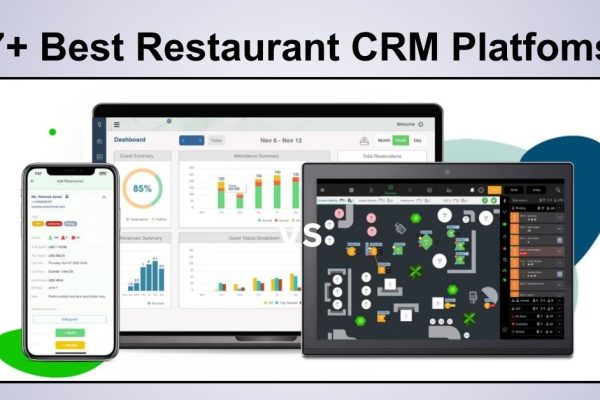7+ Best Event Management Software
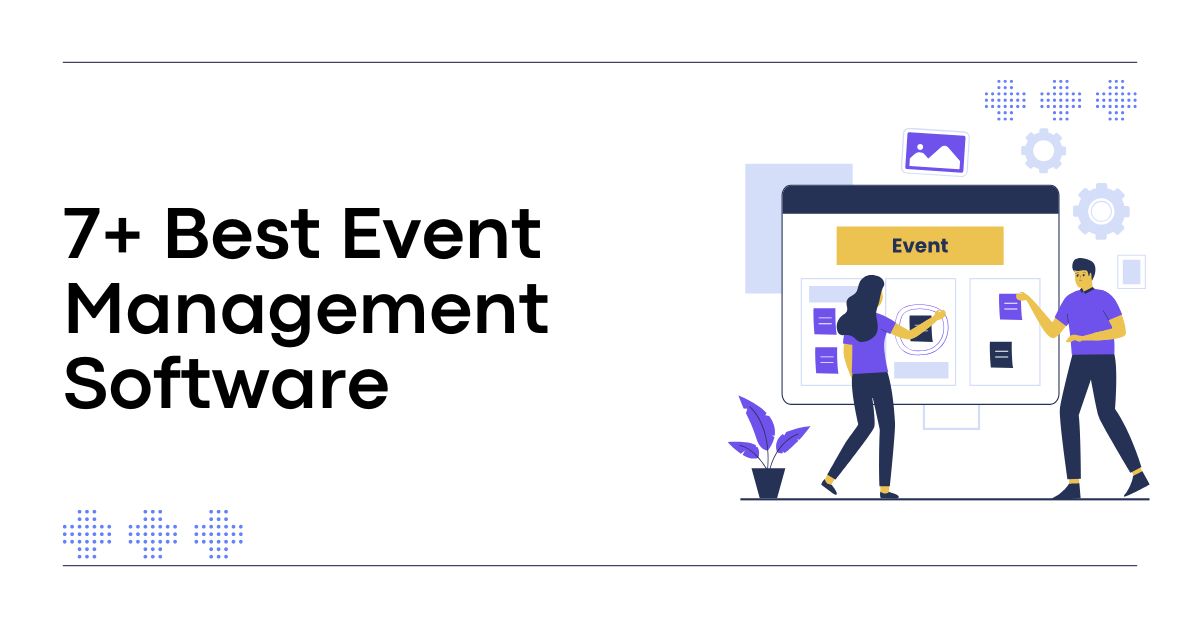
Organizing an event, whether it’s a global conference, a local workshop, or a virtual webinar, involves juggling countless moving parts. From initial planning and marketing to managing registrations, engaging attendees, and analyzing post-event success, the complexity can be overwhelming. This is where event management software becomes an indispensable asset for any planner.
These powerful platforms are designed to centralize and automate the entire event lifecycle, transforming a chaotic process into a streamlined, manageable workflow. But with hundreds of options on the market, how do you find the right one?
This guide will walk you through the essentials of event management platforms and provide a detailed look at 7+ of the top solutions available today to help you make an informed decision.
And when your event involves bringing people together from afar, managing the travel aspect is just as critical. For those in the tourism industry, elevate your booking experience with TravelWP by Physcode, the ultimate WordPress theme for creating professional and stunning travel and tour websites.
What Is Event Management Software?
At its core, event management software is a comprehensive digital toolkit that helps organizers plan, execute, market, and measure the success of an event. It consolidates a wide range of tasks into a single, integrated system. Instead of using separate tools for ticketing, email campaigns, and attendee tracking, you can manage everything from one central dashboard.
This type of event planning software is crucial for handling everything from attendee registration and payment processing to creating event agendas and gathering feedback. Its primary goal is to improve efficiency, enhance the attendee experience, and provide valuable data-driven insights.
Why Your Business Needs This Technology
Adopting a dedicated platform for event planning is no longer a luxury—it’s a necessity for staying competitive and delivering exceptional experiences. The benefits are clear and impactful:
- Improved Efficiency and Collaboration: Teams can work together seamlessly, tracking tasks, sharing updates, and managing volunteer or staff schedules in one place.
- Centralized Control: All event data, from contact information to vendor contracts and financial transactions, is stored in a single, secure location.
- Streamlined Attendee Experience: From simple online registration and payment to accessing a mobile event app with personalized schedules, the software makes participation smooth and engaging for your audience.
- Enhanced Marketing and Promotion: Integrated tools for email marketing, social promotion, and creating event websites help you reach a wider audience and drive ticket sales.
- Data-Driven Decisions: Powerful reporting and analytics features allow you to track key metrics, measure return on investment (ROI), and gather valuable feedback to improve future events.
The 7 Best Event Management Software Platforms
After extensive research based on user reviews, features, and overall value, we’ve compiled a list of the best event management software to consider for your next event.
1. Whova
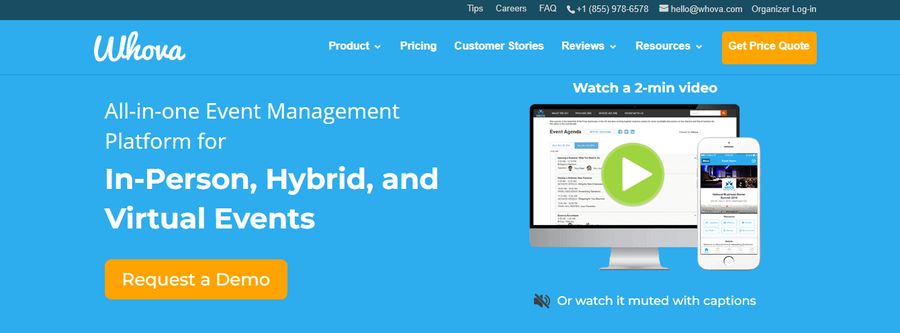
Whova is a top-rated, all-in-one platform celebrated for its ability to dramatically boost attendee engagement. It covers the entire event lifecycle for in-person, virtual, and hybrid formats, making it a highly versatile and powerful choice. With a 94% user recommendation rate, it’s a clear favorite in the industry.
Key Features:
- Activity Dashboard & Reporting/Analytics
- Advanced Attendee Management & Networking
- Mobile Event App with Gamification
- Exhibit/Vendor Management
- Surveys & Feedback Collection
Best For: Organizations focused on creating a highly interactive and engaging networking experience for attendees across all event types.
2. Eventbrite
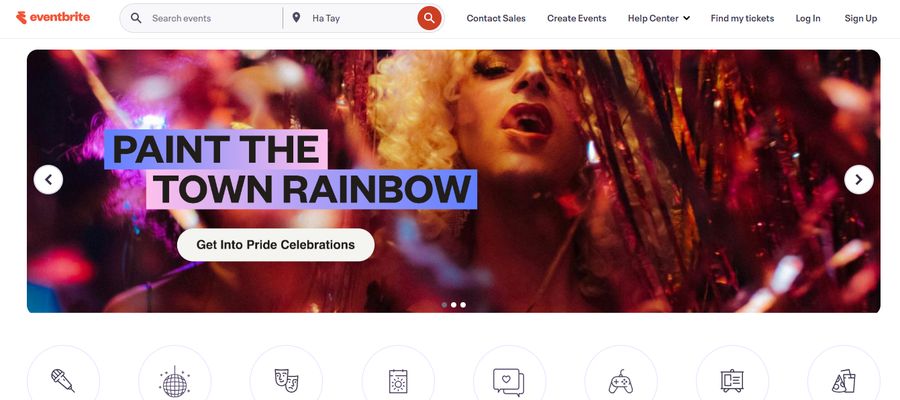
As one of the most recognizable names in the industry, Eventbrite is a robust ticketing and marketing platform. It excels at helping businesses of all sizes create, manage, and promote their events to a massive network of potential attendees. It is a trusted solution for millions of events worldwide.
Key Features:
- Ticketing & Payment Processing
- Email Marketing & Social Promotion
- Contact Management
- Reporting/Analytics
- User-friendly Attendee Check-in
Best For: Public event creators who need powerful ticketing and promotional tools to maximize reach and attendance.
3. Cvent Event Management
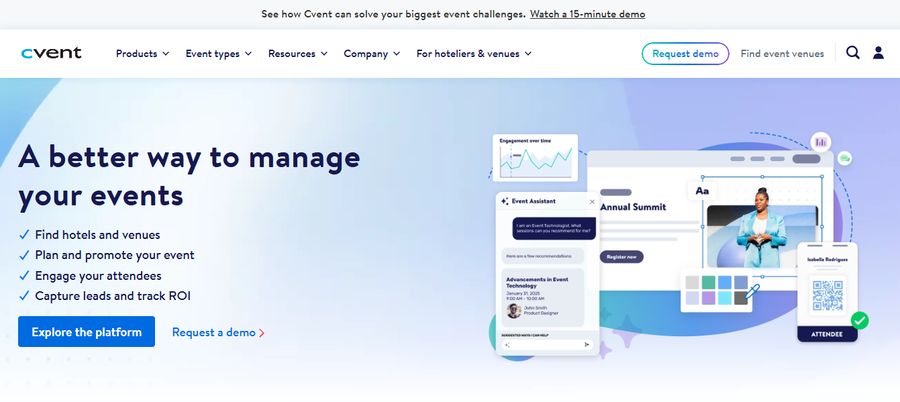
Cvent offers a complete event marketing and management platform built for the entire event lifecycle. From small meetings to large-scale international conferences, Cvent provides the tools to manage every detail for in-person and virtual audiences, making it a true enterprise-grade solution.
Key Features:
- Activity Dashboard
- Venue Sourcing & Management
- Comprehensive Registration Management
- Email Marketing Automation
- Advanced Reporting/Analytics
Best For: Medium to large organizations and professional event planners who require a comprehensive, end-to-end solution for managing complex, multi-faceted events.
4. monday.com
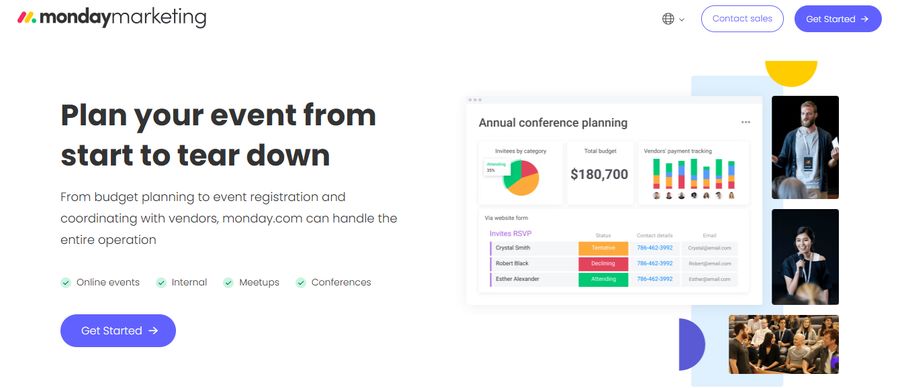
While widely known as a work operating system, Monday.com is an incredibly flexible platform that excels at managing events. Its powerful project management features allow teams to orchestrate every aspect of an event, from initial brainstorming and budget tracking to post-event feedback, all on a customizable, no-code platform.
Key Features:
- Customizable Dashboards & Reporting
- Task and Calendar Management
- Contact Management
- Team Collaboration Tools
- Integration with a wide range of apps
Best For: Teams that need a highly visual and collaborative tool to manage the project-based aspects of event planning.
5. Zoom Events and Webinars
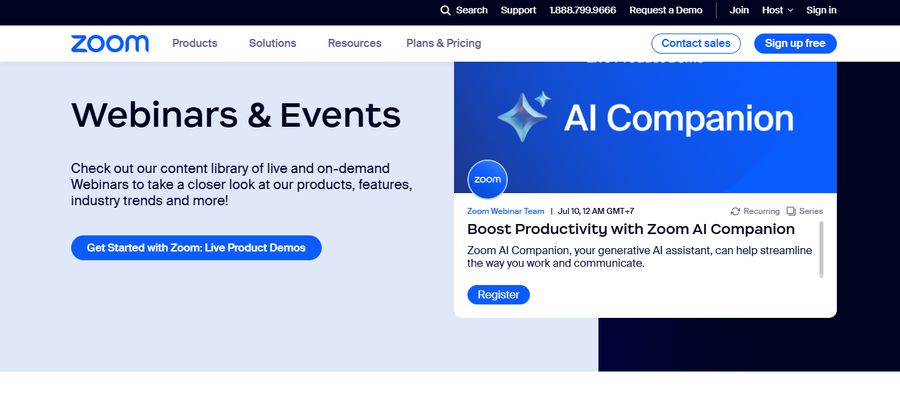
Building on the familiarity of its video conferencing platform, Zoom Events and Webinars provides a dedicated solution for hosting engaging virtual and hybrid events. It combines the reliability of Zoom Meetings and Webinars with added features for ticketing, attendee networking, and event analytics.
Key Features:
- High-Quality Video Streaming
- Ticketing and Registration
- Reporting/Analytics on Attendee Engagement
- Exhibitor/Sponsor Booths
- Surveys & Feedback
Best For: Businesses of all sizes looking for a reliable and familiar platform to host high-quality virtual and hybrid events.
6. Wix

Wix is a leading website creation platform that includes powerful built-in event management features. It allows users to create a professional online presence and seamlessly integrate event functionalities, such as creating event pages, selling tickets, and managing RSVPs, directly from their website.
Key Features:
- Website Builder with Event Templates
- Online Ticketing & RSVP Management
- Email Marketing
- Contact Management
- Payment Processing
Best For: Small businesses, entrepreneurs, and organizations that want an all-in-one solution to build their website and manage events from a single platform.
7. Momentus Technologies
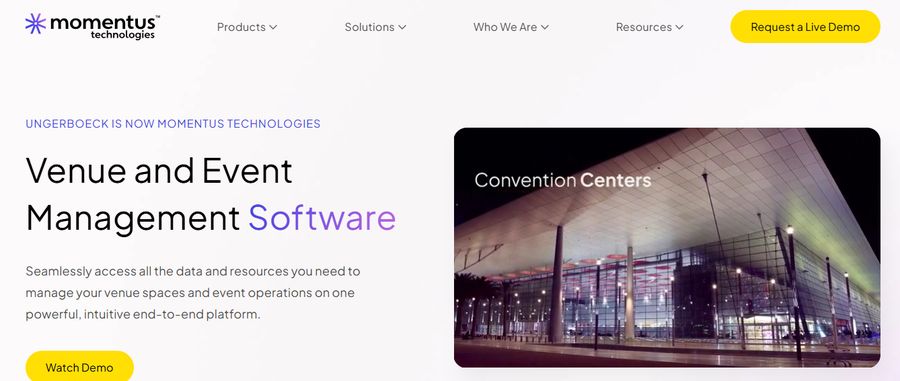
Momentus Technologies delivers an end-to-end venue and event management software solution. It is specifically designed to handle the complexities of venue booking, event planning, registration, and financial reporting, making it a powerful tool for venues and large-scale event organizers.
Key Features:
- Venue and Calendar Management
- Customer Relationship Management (CRM)
- End-to-End Event Planning Tools
- Reporting and Financials
- Exhibit/Vendor Management
Best For: Convention centers, stadiums, and other venues that need a specialized system to manage booking, sales, and event operations.
How to Choose the Right Event Planning Software
Selecting the ideal planning event software depends on your specific needs. Here are key factors to consider:
- Event Type and Size: Are your events virtual, in-person, or hybrid? The right tool will have features tailored to your format.
- Core Features: Identify your must-have features. Do you prioritize registration and ticketing, attendee engagement, or robust analytics?
- Budget: Pricing models vary from per-event fees to monthly subscriptions. Determine your budget and look for transparent pricing.
- Integrations: Ensure the software integrates with other tools you use, such as your CRM, email marketing platform, or accounting software.
- Ease of Use: A platform with an intuitive interface and good customer support will save you time and frustration.
FAQs About Event Management Software
1. What is the main purpose of event management software?
The primary purpose is to streamline and centralize the entire event planning process. It helps organizers save time, reduce errors, improve the attendee experience, and measure the success of their events through a single, integrated platform.
2. What are the most critical features to look for?
While this depends on your needs, core features typically include registration and ticketing, attendee management, email marketing and communication tools, a central dashboard for analytics, and features that support your event format (e.g., streaming for virtual events, check-in app for in-person events).
3. Can this software handle virtual and hybrid events?
Absolutely. Most modern event management software platforms are designed to support in-person, virtual, and hybrid events. They offer features like live streaming integration, virtual networking lounges, and digital sponsor booths.
4. How is this software typically priced?
Pricing models vary. Some vendors charge a flat fee per event, others charge a percentage of ticket sales, and many offer monthly or annual subscription plans. Subscription tiers are often based on the number of attendees, events, or available features.
5. What is the difference between this and Epson Event Manager software?
This is a key distinction. Event management software is for planning and executing events. In contrast, Epson Event Manager software is a utility that comes with Epson scanners. Its purpose is to make scanning easier by allowing you to assign jobs, like “Scan to Email” or “Scan to PDF,” to a button on the scanner. It is a hardware utility, not a tool for planning events.
Conclusion
The right event management software is more than just a tool; it’s a strategic partner that can elevate your events from good to unforgettable. By automating administrative tasks, it frees you up to focus on what truly matters: creating engaging content and a valuable experience for your attendees.
Take the time to evaluate your needs, explore the options like those listed above, and choose a platform that aligns with your goals. With the right technology in your corner, you’ll be well-equipped to host successful and impactful events.
Read more: 6+ Best AI Chatbot Plugins for WordPress (Free & Paid)
You may also like
7+ Best Restaurant CRM Platforms to Boost Revenue
Posted on December 23, 2025Running a successful dining establishment requires more than just excellent food and service; it requires data.
When profits are tight, building repeat customer relationships determines whether a business can succeed.
A restaurant CRM plays a crucial role as a high-value business asset.
Industry statistics frequently
7+ Best Help Desk Software for Travel and Hospitality
Posted on December 2, 2025Are you overwhelmed by a flood of booking inquiries, last-minute cancellations, and guest requests scattered across email, phone calls, and social media?
In the travel and hospitality industry, response time is the currency of trust.
A delayed response to a traveler stranded at an airport or a guest

